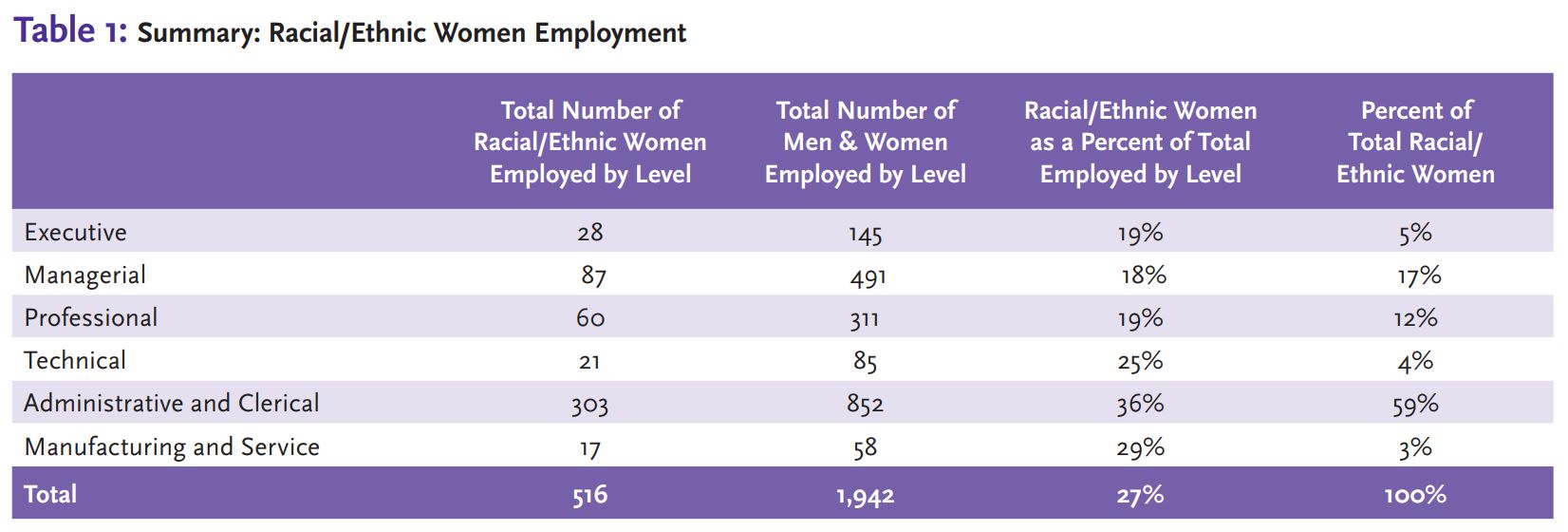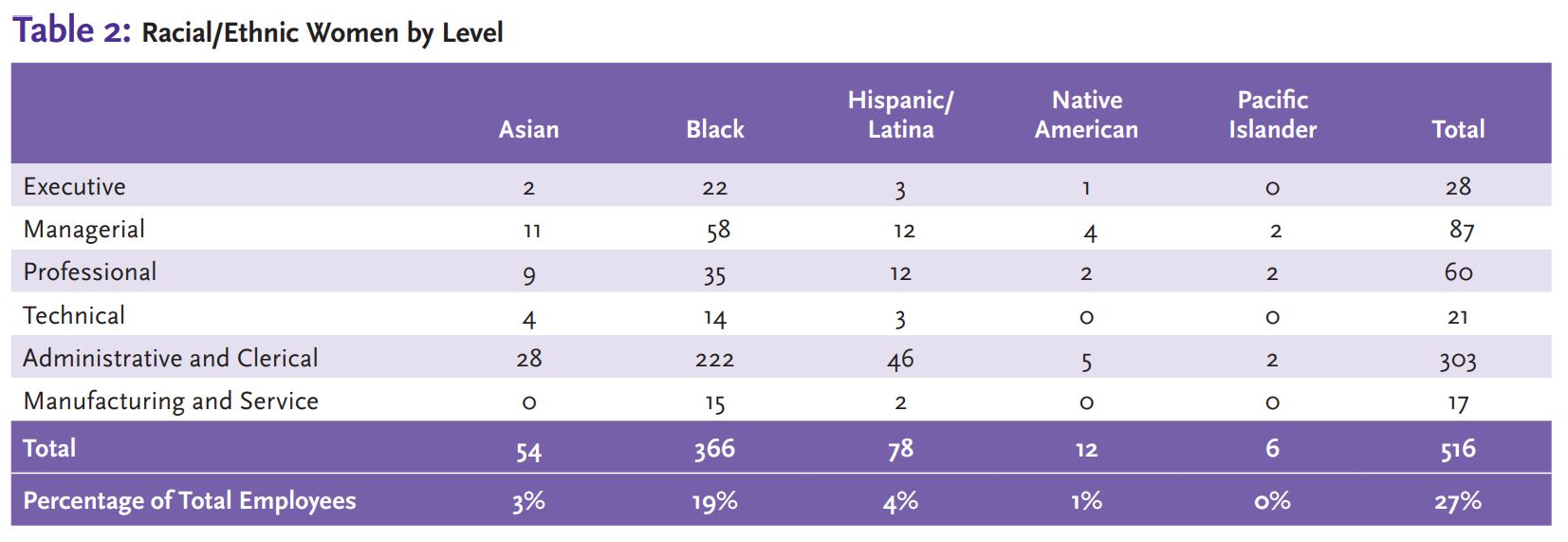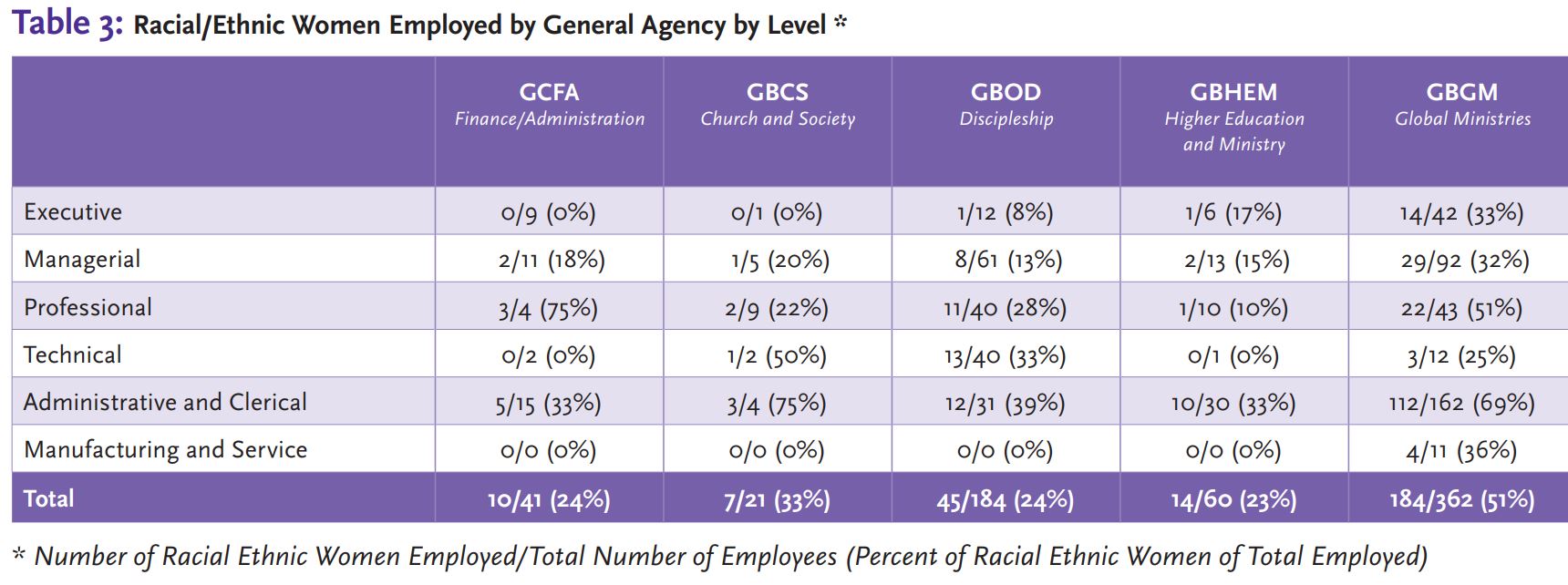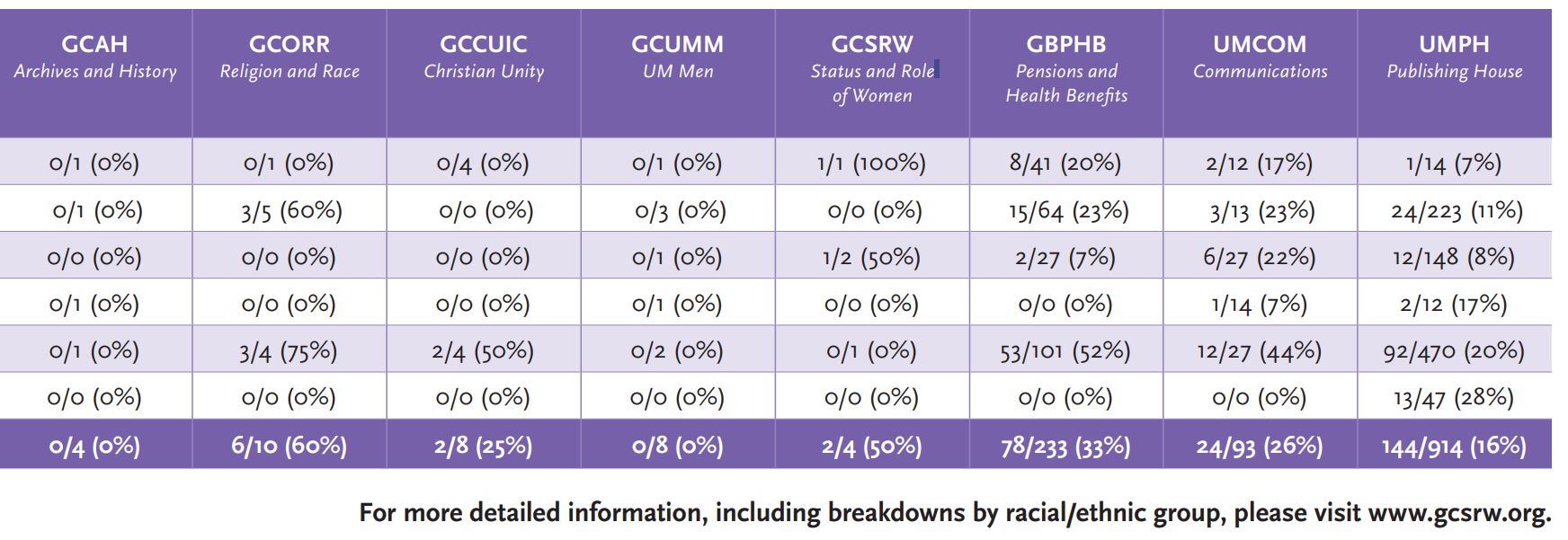Twenty-seven percent (or 516 of the 1,942) of individuals employed by the general agencies of The United Methodist Church are racial/ethnic women (see Table 1).
While racial/ethnic women do hold some of the executive, professional, and managerial positions in some of the general agencies, most of the positions they hold are in the administrative and clerical support area. In fact, 59% (or 303) of all the positions held by racial/ethnic women in the church are administrative and clerical positions (see Table 1).
The findings for this report come from the 2006 Council, Board, or Commission Annual Members Profile jointly conducted by the General Commission on Religion and Race (GCRR) and the General Commission on the Status and Role of Women (GCSRW).
Racial/ethnic women employment numbers low
The number of racial/ethnic women employed across the general agencies of the church is low. With the exception of the administrative and clerical (36%), technical (24%), and manufacturing (29%) categories, racial/ethnic women comprise 20% or less of the total number of persons employed for each category (see Table 1).
When the percentages by category are displayed within the racial/ethnic women population only, the numbers drop even more. Racial/ethnic women hold 19% of the total executive positions across the general agencies. However, of the total number of racial/ethnic women employed, only 5% hold executive positions.
The number of racial/ethnic women employed overall in the general agencies is even more dismal. Only black women register double-digit percentage points at 19%. The remainder of the racial/ethnic groups have less than 5% of the total number of employees across the general agencies.
Does intersection theory explain this?
So, why are racial/ethnic women employed at lower rates than other groups and why do racial/ethnic women find themselves mostly in the administrative and clerical positions? One answer might be intersection theory. Intersection theory is a sociological theory that argues that the interplay of race, class, and gender often results in multiple dimensions of disadvantage.




General agency workforce
In other words, the combination (or intersection) of both race and gender forces racial/ethnic women to face greater challenges than a man or white woman.
This appears to be the case with racial/ethnic women being employed by the general agencies of the church. The intersection of being both racial/ ethnic and a woman creates greater disadvantage in obtaining jobs within the church, very much like it is outside the church in the secular world.
Why is that, though? Why should racial/ethnic women face the same struggles, the same disadvantages when working for the church as the secular world? Shouldn’t it be different working for the church? Shouldn’t the church be setting the example?
Conclusion
Yes, the church should be different. In fact, General Conference has charged the church to be different. In Par. 2012 of the 2004 Book of Discipline, the General Conference, through GCSRW, challenges “The United Methodist Church, including its general agencies, institutions, and connectional structures, to a continuing commitment to the full and equal responsibility and participation of women in the total life and mission of the church, sharing fully in the power and in the policy-making at all levels of the church’s life.” (The Flyer has added italics for emphasis.)
The employment data for racial/ethnic women in the general agencies of The United Methodist Church shows that this is simply not being done. Further, relegating racial/ethnic women to administrative and clerical positions, which tends to inflate the number of racial/ethnic women employed by the church, does not meet the criteria of sharing fully in the power and in the policy-making of the church. The church must make a more concerted effort to appoint racial/ethnic women to executive positions in the general agencies in order to share in the power and in the policy-making of the church.
Why? So that we, the church, can model and show the world a community that is built on love and respect for all individuals, regardless of their race and sex. To show the world that racism and sexism are not the standards by which we live and work. To show that full and equal participation of all persons, regardless of race and sex, is how God intended us to live and work.
OVATIONS AND KUDOS
- Lyn Powell, lay leader of the North Georgia Conference since 2004 and the first woman to hold that position, has been tapped to deliver the laity address at the 2008 General Conference. She served as a delegate to the 2004 General Conference and is president of the Southeastern Jurisdiction Association of Annual Conference Lay Leaders.
- Senator Hillary Rodham Clinton (D_N.Y.) and Representative Sheila Jackson Lee (DTX) sponsored—and the president signed into law—legislation requiring that a statue of Sojourner Truth be placed permanently in the United States Capitol to honor her contribution to our nation’s history.
- The Rev. Karen Onesti, pastor of Masonville-Rancocas UMC in Mount Laurel, N.J., donated her left kidney to her friend Andrew Bossov, a rabbi at Mount Laurel’s Adath Emanu-El synagogue.
- Lauren Nelson, a member of Centenary UMC in Lawton, Okla., was recently crowned Miss America.
- Heather Peck Stahl, a freelance editor and journalist in Nashville, Tenn., and former associate editor of Interpreter magazine, has been contracted as GCSRW’s director of communications.
- Bishops Minerva Carcano and Linda Lee are to speak at Youth 2007 in Greensboro, N.C., July 11–15, 2007. Sponsored by the General Board of Discipleship’s Young People’s Ministries, more than 10,000 youth from across the globe will gather for the largest quadrennial youth event of The United Methodist Church.
Who should speak for us at General Conference?
By Pat Callbeck HarperWithin the next few months, annual conference members will elect delegates to the 2008 General Conference. Every voting member of each annual conference has an important role in deciding upon these delegates.
What makes a good delegate to General Conference? Consider the following traits and suggested questions to ask candidates:
-
Stamina, high energy and the ability to manage lots of information. Delegates spend long hours reading, studying, listening, and sharing with other delegates. Effective delegates have experience and skills in shaping policy.
Ask: How do you maintain good energy; and what skills would you use to manage lots of information in long meetings?
-
Strong speaking and listening skills. Effective decision making in legislative committees and subcommittees depends on quick thinking and clear speaking. It is even more dependent on discerning, engaged listening.
Ask: What is your experience with speaking out in intense committee meetings; and how will you make sure your concerns, suggestions, and opinions are heard? What listening skills do you rely on the most in controversial situations?
-
Experience in seeking and maintaining inclusiveness in processes and programs. Delegates will benefit from experiences in diverse communities and programs, especially the global church.
Ask: What does the term “an inclusive church” mean to you? What is your experience in the global United Methodist Church?
